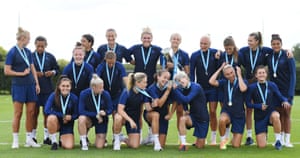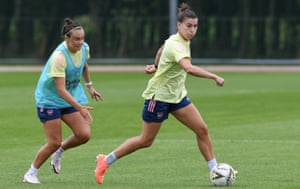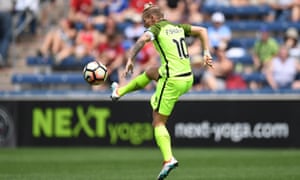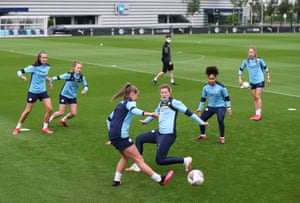When Steph Houghton is asked where she can be found at parties the reply proves as instant and incisive as one of her trademark tackles. “On the dance floor,” says the Manchester City and England captain, with even the constraints of a Zoom interview failing to filter out the light suddenly sparking in her eyes.
Those dancing shoes have gathered dust in recent months but on Saturday Houghton and City will be back strutting their stuff beneath the most enticing of metaphorical glitterballs.
Six months after its coronavirus‑induced curtailment, the Women’s Super League returns as promoted Aston Villa host City on Saturday before five more fixtures on Sunday. “We can’t wait to get going,” says Houghton. “We’re all excited by the way the league’s strengthened.”
Contrary to numerous gloomy forecasts, no team has folded in the face of the economic emergency as, rather than turning off the financial taps, speculating to accumulate seems the order of the day.
While Chelsea – awarded last season’s title ahead of City on a points-per-game basis – have broken a world transfer record to sign the Denmark forward Pernille Harder from Wolfsburg for around £300,000, City recently recruited the US World Cup winners Rose Lavelle and Sam Mewis on loan. Not to be outdone, that pair’s arguably closest challengers – Joe Montemurro’s sweet-passing, free‑scoring Arsenal – possess three new high-profile Australians in Steph Catley, Caitlin Foord and Lydia Williams.

This international influx forms part of an unprecedented raft of imports in the 12-team top tier. They arrive at a moment when the WSL has agreed groundbreaking television deals with broadcasters in the US, Germany, Australia, Italy, Scandinavia and South America.
“The WSL’s gone from strength to strength,” says Catley. “It really is on a par with the US and a lot of the quality Americans are playing over here. This is the place you want to be; you’re coming up against the world’s best players week in, week out.”

Money provides an increasing attraction. With a loophole enabling parent companies rather than clubs to pay players’ wages, managers sometimes sidestep the WSL’s salary cap, which stipulates no more than 40% of revenue must be spent on remuneration. This circumvention allows top performers to command about £200,000 a year.
If there are real concerns about a growing gap between rich and poor, with some squad players at smaller clubs earning £20,000 per annum, mid-table teams look reassuringly strong. Perhaps most notably Reading, fifth last season, have signed the outstanding Wales midfielder Jess Fishlock on loan from Seattle’s OL Reign.
“The WSL still has a way to go but it has an unbelievable opportunity,” says Fishlock. “Because of the way the pandemic’s affected women’s football in America, there’s players here who probably wouldn’t have been in a normal year so this season’s going to be pretty special. It’s bridging that gap with America massively. The football will be spectacular.”

There should also be some intriguing coaching duels. If Chelsea’s Emma Hayes possesses the rare knack of marrying an advanced grasp of tactical nuance with stellar handling of human emotion, rivals including Manchester City’s new manager, Gareth Taylor, and Manchester United’s Casey Stoney are queuing up to outwit her.
Among Hayes’s key strengths is the capacity to reinvent her own techniques and the first XI each season. Given that she possesses three of the most dangerous attacking players around in Harder, Beth England and Fran Kirby, Stoney could have her work cut out when Chelsea visit United on Sunday.
Taylor, City’s former men’s under-18 coach, is stepping into Nick Cushing’s old shoes as well as the unknown. “Watching his under‑18s I developed the utmost respect for Gareth, I’m really impressed with his level of detail,” says Houghton.
“I also thought he was really nice but I’ve discovered he’s quick to have a go at us if things aren’t perfect. But we need to be pushed and challenged.”
As Lavelle and Mewis plot how to create sufficient goals for City’s England striker, Ellen White, to out-score her Chelsea rivals, the geographical imbalance that leaves the WSL with no team north of Manchester and Merseyside worries those responsible for the game’s wider development.
During her schooldays in Cumbria, White’s fellow City and England forward Georgia Stanway spent countless, often antisocial hours being driven up and down motorways to training by her parents.

If their sacrifice required any further vindication it came in the shape of Lavelle’s and Mewis’s relocation. “It’s exciting City are investing and willing to sign big players,” says Stanway. “It’s unbelievable to have Rose and Sam here but we’re pushing to make this the best league in the world and playing with them can only improve us all.”
Although Stoney’s side, fourth last term, are bolstered by the arrival of the England midfielder Lucy Staniforth from Birmingham, her budget is not quite in the same league. By way of exacerbating the divide, the United manager’s innovative methods – perhaps most eye‑catchingly encouraging players to handle spiders – are inhibited by coronavirus protocols.
“Once they end, Casey will be getting us ballroom dancing and [other] stuff again,” the United defender Amy Turner says. “She takes you out of your comfort zone by making you really uncomfortable and doing things you hate. She’s different – and an outstanding manager.”
Across Manchester, Stoney’s one-time England defensive partner is equally keen on returning to normality. Among the most accessible of high-profile sportswomen, Houghton looks forward to returning to mingling with supporters with the same sort of zest she reserves for donning her life-affirming dancing shoes once more.
“I’m all for trying to get fans back into stadiums,” she says. “This league’s come on so much I’d love to see as many people as possible able to watch the quality of our play and players.”
from Football | The Guardian https://ift.tt/2QVJGRN
via IFTTT

No Comment